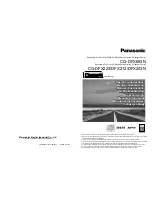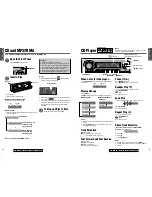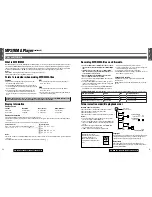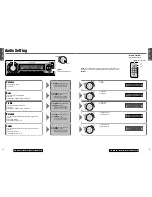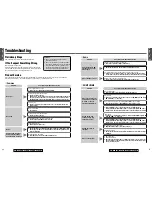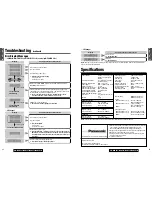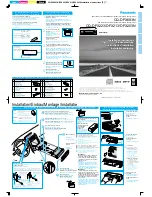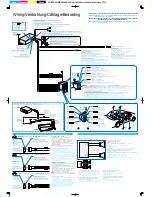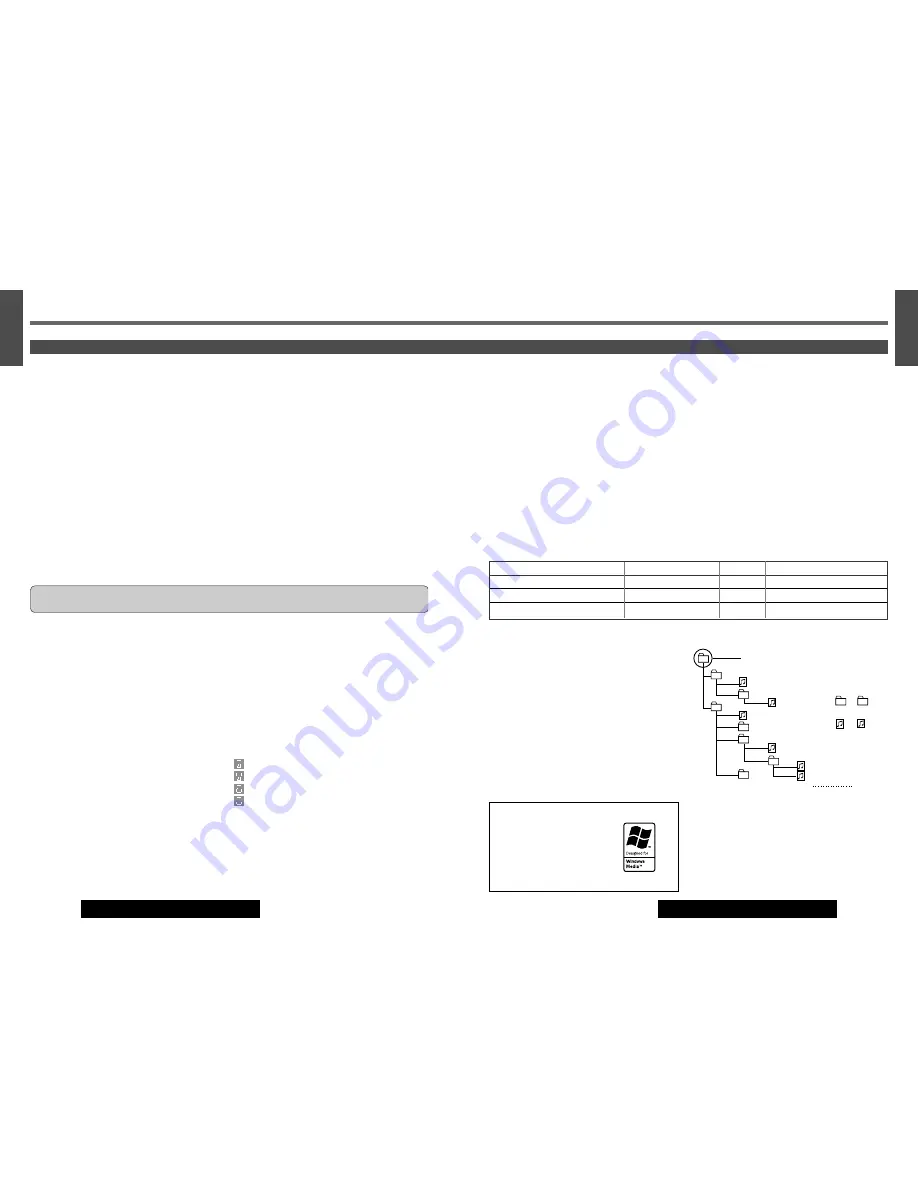
26
27
17
E
N
G
L
I
S
H
18
E
N
G
L
I
S
H
CQ-DFX683/DFX223/DFX213/DFX203N
CQ-DFX683/DFX223/DFX213/DFX203N
MP3/WMA Player
(continued)
Notes on MP3/WMA
Folder selection order/file playback order
Root Folder
(Root Directory)
Folder Selection
File Selection
Tree 1
Tree 2
Tree 3
Tree 4
Tree 8
(Max.)
2
1
3
4
q
q
w
e
r
t
y
y
5
6
8
1
8
7
–
In the order
–
In the order
Maximum number of files/folders
¡
Maximum number of files/folders: 999 (files + folders)
¡
Maximum number of files in one folder: 255
¡
Maximum depth of trees: 8
¡
Maximum number of folders: 255 (Root folder is included.)
Notes:
¡
This unit counts the number of folders irrespective of the
presence or absence of MP3/WMA file.
¡
If the selected folder does not contain any MP3/WMA files,
the nearest MP3/WMA files in the order of playback will be
played.
¡
Playback order may be different from other MP3/WMA
players even if the same disc is used.
¡
“ROOT” appears when displaying the root folder name.
Copyright
It is prohibited by copyright laws to copy, distribute and deliver
copyrighted materials such as music without the approval of
copyright holder except enjoying yourself personally.
No warranty
Above description complies with our investigations as of
December 2002. It has no warranty for reproducibility and dis-
playability of MP3/WMA.
Windows Media, and the
Windows logo are trademarks, or
registered trademarks of
Microsoft Corporation in the
United States and/or other coun-
tries.
What is MP3/WMA?
MP3 (MPEG Audio Layer-3) and WMA (Windows Media
TM
Audio) are the compression formats of digital audio. The former
is developed by MPEG (Motion Picture Experts Group), and the latter is developed by Microsoft Corporation. Using these
compression formats, you can record the contents of about 10 music CDs on a single CD media (This figures refer to data
recorded on a 650MB CD-R or CD-RW at a fixed bit rate of 128 kbps and a sampling frequency of 44.1 kHz).
Notes:
¡
MP3/WMA encoding and writing software is not supplied with this unit.
¡
CD writing software is not supplied with this unit.
Points to remember when making MP3/WMA files
Common
¡
High bit rate and high sampling frequency are recom-
mended for high quality sounds.
¡
Selecting VBR (Variable Bit Rate) is not recommended
because playing time is not displayed properly and sound
may be skipped.
¡
The playback sound quality differs depending on the
encoding circumstances. For details, refer to the user
manual of your own encoding software and writing soft-
ware.
MP3
¡
It is recommended to set the bit rate to “128 kbps or
more” and “fixed”.
WMA
¡
It is recommended to set the bit rate to “64 kbps or
more” and “fixed”.
¡
Do not set the copy protect attribute on the WMA file to
enable this unit to play back.
Displayable characters
¡
Displayable length of file name/folder name: within 96 characters
¡
Name files and folders in accordance with the standard of each file system. Refer to the instructions of writing software
for details.
¡
ASCII character set and special characters in each language can be displayed.
ASCII character set
A to Z, a to z, digits 0 to 9, and the following symbols:
(space) ! ” # $ % & ’ ( ) * + , - . / : ; < = > ? @ [ \ ] ˆ _ ` { | }
~
Special characters
À Á Â Ã Å à á â ã å
Ä ä
Ò Ó Ô Õ Ö ò ó ô õ ö
Ù Ú Û Ü ù ú û ü
Notes
:
¡
With some software in which MP3/WMA format files have been encoded, the character information may not be displayed
properly.
¡
Undisplayable characters and symbols will be converted into an asterisk (
*
).
Display Information
Displayed items
Caution
:
Never assign the “mp3”, or “wma” file name extension to a file that is not in the MP3/WMA format. This
may not only produce noise from the speaker damage, but also damage your hearing.
CD-TEXT
¡
Disc title
¡
Track title
MP3/WMA
¡
Folder name
¡
File name
MP3 (ID3 tag)
¡
Artist name
¡
Title name
WMA (WMA tag)
¡
Artist name
¡
Title name
Recording MP3/WMA files on a CD-media
¡
You are recommended to minimize the chances of mak-
ing a disc that contains both CD-DA files and MP3/WMA
files.
¡
If CD-DA files are on the same disc as MP3 or WMA
files, the songs may not play in the intended order, or
some songs may not play at all.
¡
When storing MP3 data and WMA data on the same
disc, use different folders for each data.
¡
Do not record files other than MP3/WMA files and unnec-
essary folder on a disc.
¡
The name of MP3/WMA file should be added by rules as
shown in the following descriptions and also comply with
the rules of each file system.
¡
You may encounter trouble in playing MP3/WMA files or
displaying the information of MP3/WMA files recorded
with certain writing software or CD recorders.
¡
The file extension “mp3” or “wma” should be assigned to
each file depending on the file format.
¡
This unit does not have the play list function.
¡
Although Multi-session recording is supported, the use of
Disc-at-Once is recommended.
Supported file systems
ISO 9660 Level 1/Level 2, Apple Extension to ISO 9660,
Joliet, Romeo
Note:
Apple HFS, UDF 1.50, Mix CD (CD Extra) is not sup-
ported.
32, 44.1, 48 kHz
No
64k-192 kbps
Windows Media Audio Ver. 2, Ver. 8
16, 22.05, 24 kHz
YES
8k-160 kbps
MPEG 2 audio layer 3 (MP3)
32, 44.1, 48 kHz
YES
32k-320 kbps
MPEG 1 audio layer 3 (MP3)
Sampling frequency
VBR
Bit rate
Compression method
Compression formats
(
Recommendation:
“Points to remember when making MP3/WMA files” on the previous page)

